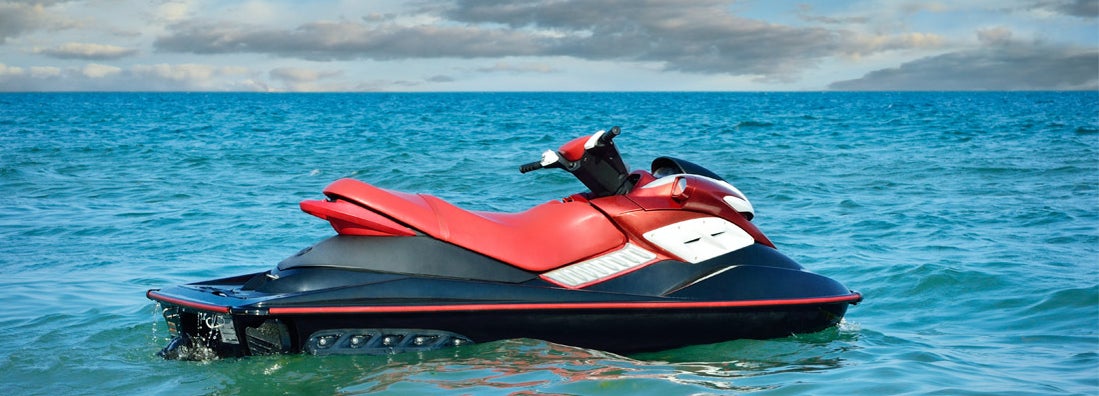Connecticut PWC Insurance
Find the right pwc insurance policy for you.

One of Connecticut's best-kept secrets is its more than 1,600 lakes. That's more lakes per square mile than most of the more expansive states. With such an abundance of water bodies on which to play, the popularity of personal watercraft has exploded in the Nutmeg State. And finding the right insurance policy to cover your craft and your personal finances can be tricky. Before you search for PWC insurance quotes, there are a few things to consider.
Use our independent agent matching system to find the best insurance plan in your area. You tell us what you’re looking for, and our technology will recommend the best agents for you. Any information you provide will be sent to only the agents you pick. We do not sell to third parties.
What Are Connecticut's Laws Regarding PWCs?
PWCs can travel at extremely fast speeds. This makes them extremely enjoyable. But this feature also makes them dangerous. Connecticut has instituted several laws regarding PWCs in order to keep residents and visitors safe:
- Operators of PWCs, regardless of state residency, must possess a Certificate of Personal Watercraft Operation. Many states accept the Connecticut Safe Boating Certificate and Certificate of Personal Watercraft Operation. Connecticut recognizes certificates from New York, Massachusetts and Rhode Island for use on it waters.
- No person under 16 years of age who received a Certificate of Personal Watercraft Operation after March 9, 2004, may operate a personal watercraft without the supervision of a person who is at least 18 years of age and in possession of a CPWO.
- Operators between the age of 12 and 16 who received a CPWO on or before March 9, 2004, may operate a personal watercraft by themselves, although the DEP recommends that they be accompanied by a person 18 years or older who possesses a certificate.
- All out of state boaters must be 16 to operate a personal watercraft by themselves.
Is Your PWC Insurable?
PWCs, also called water scooters, are recreational vessels that come in different varieties: stand up PWCs, sit down PWCs and two to four person PWCs. PWCs have an inboard engine driving a pump jet that has a screw-shaped impeller to create thrust for propulsion and steering.
Trademarked PWC brand names include such brands as Jet Ski, WaveRunner and Sea-Doo. Some PWCs are considered "mini subs" as they are submersible and can dive under water. The United States Coast Guard defines a personal watercraft, amongst other criteria, as a jet drive boat less than 13 feet in length, in order to exclude from that definition more conventional-sized jet boats. There is a wide variety of "jet boats," many of which exceed 30 to 40 feet in length.
Chances are most Connecticut insurance companies will be familiar with the make and model of PWC that you own and have an insurance policy to cover it.
Why Is PWC Insurance Important in Connecticut?
Many Connecticut residents are taking to the lakes with their PWCs. The size, speed, agility and ease of handling make them fun for all ages. All that speed and power, however, can lead to accidents and collisions. The National Institutes of Health reports that as PWC popularity increases, so do accidents and injuries.
These are some year 2012 facts from the United States Coast Guard:
- Nearly 50 PWC accidents occurred on Connecticut waters in 2012.
- Six Connecticut residents died, and dozens more were injured.
- Almost $1 million in damage to property resulted from PWC collisions or accidents in the state.
- There were 28 property damage reports due to recreational boating that year, averaging nearly $38,000 worth of damage per incident.
What Causes PWC Accidents?
Although alcohol was involved in a number of reported accidents, the leading causes of PWC accidents may surprise you:
- Rider error
- Rider inattentiveness/lack of experience
- Excessive speeds
Riding at 60 miles per hour with the wind in your hair and the cool wake spraying you down feel great. But be aware that Connecticut posts speed limits on a number of its lakes and rivers. There is a reason why you are restricted to operating at 10 miles per hour in many areas. The safety of swimmers, anglers, other boaters and especially you is at stake.
What Does PWC Insurance Cover?
Most insurance companies offer a variety of PWC insurance options. It's a good idea to discuss the following types of coverage and issues with your independent agent before you make a choice:
- Bodily injury liability: If you cause an accident that damages another boater or a swimmer, you could be liable for any costs related to their injuries, and could be taken to court. This offers some cost protection to shield you from major loss.
- Property damage liability: Accidents can be costly. This type of coverage helps to repair your PWC and pay for damage it causes to other people's property.
- Medical payments coverage: This coverage reimburses for medical payments if you or another rider suffers injuries while operating your PWC.
- Uninsured and underinsured boater: If you crash with an uninsured/underinsured boater, this coverage pays for any damage or injuries caused.
- Pollution coverage: This coverage pays for pollution cleanup for which you are liable.
- Towing and assistance: If your PWC becomes inoperable while on the water, you’ll need assistance and maybe a tow to shore.
- Wreckage removal: In the event of a serious accident, your PWC may sink. Some communities require an owner to recover sunken watercraft. The coverage typically includes recovering, towing and destroying a damaged PWC.
- Watersport liability: Some PWCs have enough power to reach 60 miles per hour and can pull a skier or wake boarder. If you own one of these models, make sure your liability insurance covers injuries, liability claims and legal fees. The last thing you want to pay for is a lawsuit.
- Accessory coverage: You may have enhanced your PWC with accessories. The cost of these accessories can add up, so you may want to ask about insuring them. This coverage can help you recover the cost of damaged or stolen accessories.
What Is an Average Quote for PWC Insurance
The quotes you get for your PWC insurance premium depend on a number of factors, including the make; model and horsepower of your watercraft; and the options and deductibles you choose. Depending on the types of coverage and amounts you choose, the average annual premium you can expect to pay will likely range between $300 and $500 per year.
Typically, the following factors will determine your quoted PWC insurance premium:
- Your driving record
- Your experience operating PWCs
- The watercraft’s horsepower
- The type and amount of coverage you choose
- The deductible you choose
- Your credit history
Some Connecticut insurance companies will offer you a discount if you qualify. You may be able to get discounts for doing the following:
- Taking a safe boating course
- Remaining claims-free
- Bundling your PWC insurance with another policy, such as vehicle or homeowners insurance
- Paying your premium once per year rather than every month
Protect Yourself with PWC Insurance
Much like a lifejacket, PWC insurance can protect you from sinking financially. Finding the right policy at an affordable price doesn't have to be time-consuming work when you contact an independent Trusted Choice® agent. Our experienced, knowledgeable agents can help you research quotes and find a PWC insurance policy that meets your needs, lifestyle and budget.
Before you decide to go on the water to enjoy your PWC, contact an agent in your area for your quotes and coverage.
